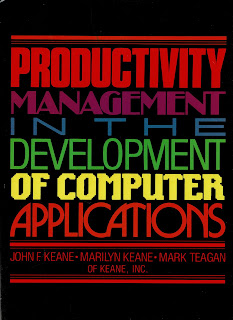Keane's Project Management Approach
The Six Principles
1. Define the Job in Detail. Determine exactly what work must be done and what tangible results must be delivered. Explicitly evaluate the non-technical environment and customer expectations, and address all areas in writing.2. Get the Right People Involved. Involve the entire project team, including the customers, from the beginning stages of planning throughout the life of the project. Ensure that each member of the project team participates in defining his or her own goals.3. Estimate the Time and Costs. Develop a detailed estimate of each phase, iteration, or release of the project before undertaking the effort. Estimate the components of a job separately to increase accuracy. Do not estimate what you do not know.4. Break the Job Down Using the 80-Hour Rule. Break the job down into "tasks" that require no more than 80 elapsed hours (2 weeks) to complete. Ensure that each task results in a tangible deliverable. The 80-Hour Rule provides the framework for setting schedules, assigning tasks, identifying problems early, confirming time and cost estimates, and evaluating project progress and individual performance.5. Establish a Change Procedure. Recognize that change is an inherent part of all projects. Establish a formal procedure for dealing with change and ensure that all parties agree to the procedure in advance.6. Agree on Acceptance Criteria. Determine in advance what will constitute an acceptable outcome. Obtain written acceptances of deliverables throughout the project so that acceptance is a gradual process, rather than a onetime event at the end.
According to the History of Keane video published in 1993 - John Keane reflected that early on, in the early 1970's, he had to return back from vacation early as several projects were running over time and over budget. He gathered a plethora of information about these projects and went off to think about what the issues were. When he came back - he came back with the foundations of what would be later called, Productivity Management - the principles that would allow Keane to run projects consistently well.
In 1974 - Keane offered Productivity Management as a service offering. In 1984, the first edition of Productivity Management was published. It was revised in 1995 and then again in 2002. All Keane consultants were taught the principles of PM and carried out their work using it's principles.
3rd Edition
Productivity Management - Keane's Project Management Approach
by John F. Keane, Marilyn Keane and Mark Teagan
Published in 2002
2nd Edition
Productivity Management - Keane's Project Management Approach for Systems Development
by John F. Keane, Marilyn Keane and Mark Teagan
Updated and revised by Donald H. Plummer, PMP
Published in 1995
1st Edition
Productivity Management in the Development of Computer Applications
by John F. Keane, Marilyn Keane and Mark Teagan
Published in 1984
Images are from my collection of the books except for the Second Edition which was from https://archive.org/details/productivitymana0000kean




